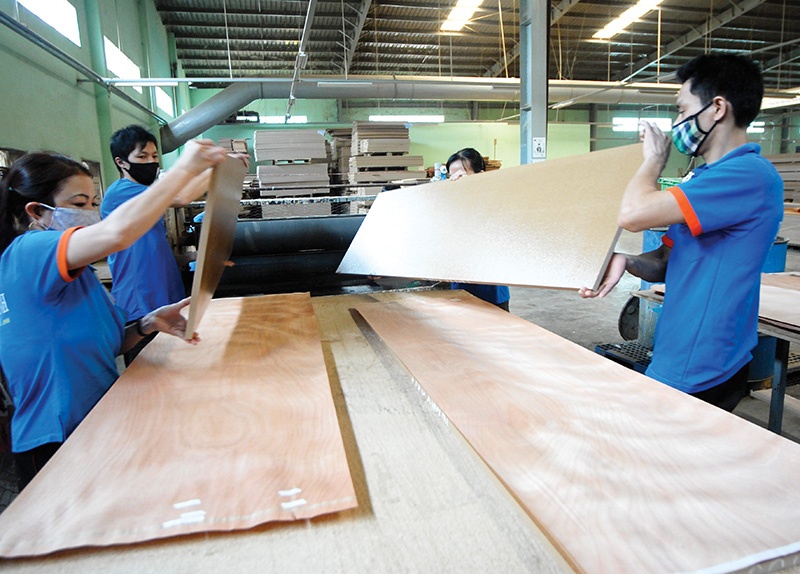Timber deal clearing path for US trade
 |
| Vietnam’s timber and furniture exporters will be relieved that the US investigation has been concluded. Photo:Le Toan |
US Trade Representative Katherine Tai announced on October 1 that an agreement had been reached with Vietnam addressing the former’s concerns regarding the Timber Section 301 investigation, which relates to environmental matters.
The agreement is meant to secure Vietnam’s commitment to “keep illegally harvested or traded timber out of the supply chain and protect the environment and natural resources,” as stated by the Office of the US Trade Representative (USTR).
“Ambassador Tai determined that the agreement provides a satisfactory resolution of the matter subject to investigation and that no trade action is warranted at this time,” noted the USTR.
The agreement that both countries signed ended a year of anxiety for Vietnamese furniture exporters and recognises the partnership between Vietnamese manufacturers and American buyers.
Vietnam had been tasked with solving issues related to illegally sourced or traded timber, including improving the legal framework, removing confiscated timber, verifying legality of domestically harvested timber, and working with high-risk countries to improve border checks and law enforcement cooperation.
“I commend Vietnam for its commitment to address our concerns,” said Tai. “With this agreement, Vietnam will provide a model, both for the Indo-Pacific and globally, for comprehensive enforcement against illegal timber.”
President Joe Biden is helping Vietnam by gradually removing investigations of the previous administration related to alleged violations of trade regulations.
Last October, the USTR launched an investigation under Section 301 of the US Trade Act of 1974 to investigate Vietnam’s use of allegedly illegally harvested or traded timber. This agreement – along with that between the US Treasury Department and the State Bank of Vietnam in July to settle accusations of currency manipulation – ensures that the door for exports to the US is opened again.
Vietnam’s wood processing industry still relies on exports to the US market for efficiency because this market represents the largest and fastest growing. Despite the impacts of the pandemic, Vietnam’s timber exports in the first eight months of 2021 reached $6.4 billion, up 58.8 per cent over the same period in 2020. Last year, total exports of timber and products thereof to the US reached $7.4 billion, accounting for 57 per cent of the total export in the sector.
“The signing of the agreement marks the beginning of an era of tighter control within the import-export supply chain more closely, including the domestic market, which up to now was rather loose,” said Dr. To Xuan Phuc from non-profit organisation Forest Trend.
Though the USTR does not impose sanctions on Vietnamese timber items exported to the US, Vietnam’s government has to commit to several new conditions, some of which are relatively strict, Phuc said.
Tran Le Huy, general secretary of the Binh Dinh Forest Products Association explained, “Vietnam is trying to improve the legal framework, inspect, and supervise the import of input materials more closely to ensure a transparent production system.”
Vietnam’s legal system for the sector encompasses Decree No.102/2020-ND-CP, stipulating the legal timber guarantee system as well as several other commitments that Vietnamese manufacturers have to strictly comply with.
Huy, who has been observing forest-related policy development for more than two decades, said, “I have never seen such a large number of timber investigations before. Thus, we are required to reduce risks in the import of wood materials, and this needs to be done with both policy adjustments and practical activities.”
On average, Vietnam annually imports 2-2.5 million cubic metres of round timber from Africa, South America, Laos, Cambodia, and Papua New Guinea, equivalent to 40-50 per cent of the total volume of imported logs and sawn timber.
What the stars mean:
★ Poor ★ ★ Promising ★★★ Good ★★★★ Very good ★★★★★ Exceptional
Related Contents
Latest News
More News
- NAB Innovation Centre underscores Vietnam’s appeal for tech investment (January 30, 2026 | 11:16)
- Vietnam moves towards market-based fuel management with E10 rollout (January 30, 2026 | 11:10)
- Vietnam startup funding enters a period of capital reset (January 30, 2026 | 11:06)
- Vietnam strengthens public debt management with World Bank and IMF (January 30, 2026 | 11:00)
- PM inspects APEC 2027 project progress in An Giang province (January 29, 2026 | 09:00)
- Vietnam among the world’s top 15 trading nations (January 28, 2026 | 17:12)
- Vietnam accelerates preparations for arbitration centre linked to new financial hub (January 28, 2026 | 17:09)
- Vietnam's IPO market on recovery trajectory (January 28, 2026 | 17:04)
- Digital economy takes centre stage in Vietnam’s new growth model (January 28, 2026 | 11:43)
- EU Council president to visit Vietnam amid partnership upgrade (January 28, 2026 | 11:00)

 Tag:
Tag:




















 Mobile Version
Mobile Version